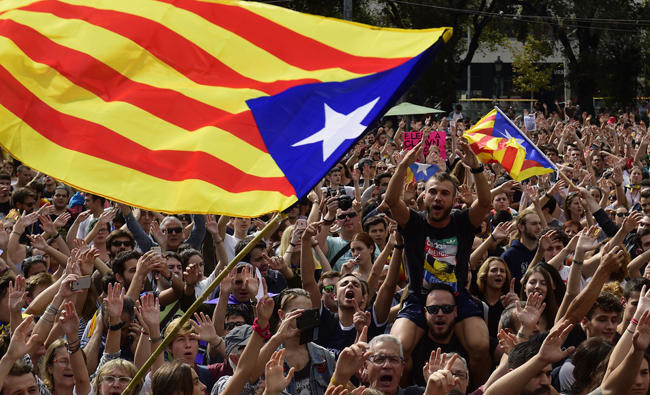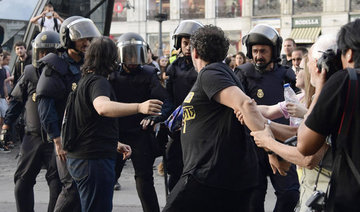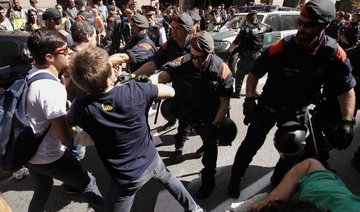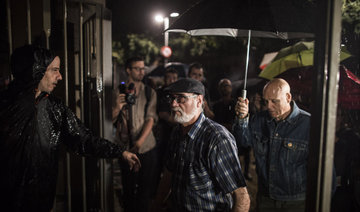MADRID: Spain came under international pressure Monday to resolve a spiraling crisis with its Catalan region after a banned independence referendum was marred by shocking scenes of police violence.
The country’s central government vowed to stop its northeastern region breaking away from Spain after Catalonia’s leader claimed that 90 percent of voters backed independence in Sunday’s referendum, which Madrid says is unconstitutional and a “farce.”
Abroad, the focus was on Sunday’s violence, which saw riot police move in on polling stations in towns and cities across the region to stop people from voting, in some cases baton-charging and firing rubber bullets to disperse crowds.
“We call on all relevant players to now move very swiftly from confrontation to dialogue. Violence can never be an instrument in politics,” European Commission spokesman Margaritis Schinas said, breaking weeks of virtual EU silence on the Catalan issue.
UN rights chief Zeid Ra’ad Al Hussein said he was “very disturbed” by the violence and urged the Spanish authorities to ensure a thorough and impartial investigation while EU President Donald Tusk urged Madrid to avoid “further use of violence.”
The European Parliament will hold a special debate on Wednesday on the referendum, the head of the assembly said.
In Catalan cities, many residents briefly stopped work at midday and descended onto the streets in silent, solemn protest.
In Barcelona, hundreds more stopped traffic as they rallied, many draped in the blue, yellow and red Estelada flag used by Catalan separatists, shouting “the streets will always be ours.”
No joy for Rajoy
The government of Prime Minister Mariano Rajoy was holding emergency talks after Catalan president Carles Puigdemont declared Sunday that the region — which accounts for a fifth of the nation’s GDP — had “won the right to an independent state.”
Puigdemont appealed for international mediation to help solve the crisis, and hinted he may be willing to drop the independence drive if that happened.
He also called for all police deployed to Catalonia from other parts of Spain for the vote to be removed.
The regional government said 2.26 million people took part in the vote, or just over 42 percent of the electorate in Catalonia.
But any attempt to unilaterally declare independence is likely to be opposed not just by Madrid but also a large section of the Catalan population, a region of 7.5 million people which is deeply split on the issue.
Rajoy reiterated his government’s position that the vote was an illegal act, to which the state had reacted “with firmness and serenity.”
Puigdemont has said he would now present the results to the region’s parliament, ruled by majority separatist lawmakers, which has the power to adopt a motion of independence.
'Resign!'
Several top figures in the far-left party Podemos called for Rajoy to resign over his handling of the crisis.
Shocking videos posted on social media showed police dragging voters from polling stations by their hair, throwing people down stairs and attacking Catalan firefighters protecting polling stations.
Puigdemont said close to 900 people had received medical attention, although Catalan authorities confirmed a total of 92 injured.
Four were hospitalized, two in serious condition — a 70-year-old man had a heart attack and another was hurt in his eye.
Adding to tensions, unions and Catalan associations have called a region-wide strike for Tuesday due to “the grave violation of rights and freedoms.”
'Biggest political crisis'
The Catalan situation is considered Spain’s biggest political crisis since an attempted military coup d’etat in 1981.
While Spanish newspapers were unanimous in criticizing Puigdemont for pushing ahead with the referendum despite a court ruling it unconstitutional, they also took aim at Rajoy’s handling of the crisis.
Rajoy will hold talks later Monday with the leader of the main opposition Socialist party, Pedro Sanchez, as well as Albert Rivera, the leader of the centrist party Ciudadanos, his minority government’s ally in parliament.
Justice Minister Rafael Catala said the government could invoke Article 155 of the constitution which would allow it to suspend the powers of Catalonia’s regional government in order to block any declaration of independence.
“That is a tool that is there... We have always said that we will use all the force of the law, all the mechanisms that the constitution and the laws grant the government,” he said in an interview with public television.
Some analysts said the images of the crackdown may help boost international support for the secessionists.
“Catalan secession remains unlikely, but separatist sentiment now has a momentum of its own,” said Federico Santi, an analyst at political risk consultancy Eurasia Group.
“The resulting institutional crisis will be severe and poses significant risks to Spain’s economic outlook.”
The euro and the Spanish stock market slid on Monday after the vote, with bank shares particularly hard hit.


























